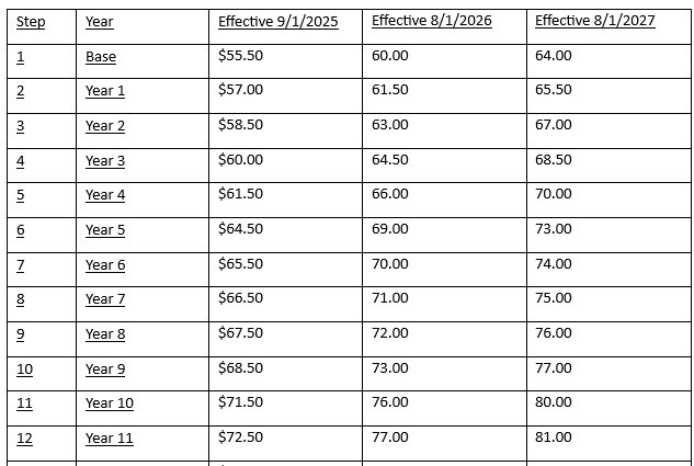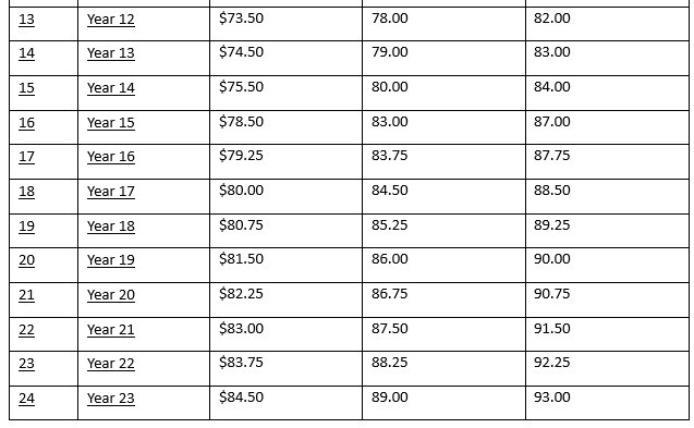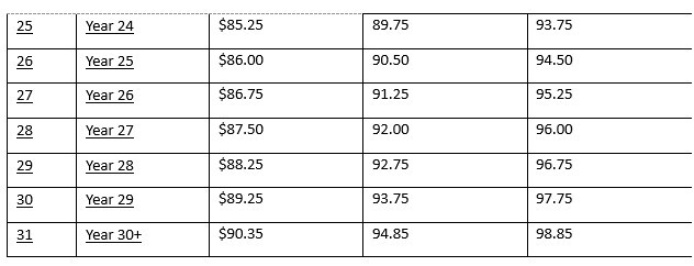Bargaining Update Sessions 20 and 21
Posted Oct 20, 2025
Federal Mediator Introduced – TAs Reached
We are pleased to report significant progress during days 20 and 21 of contract negotiations that we hope will create momentum toward additional agreements in the upcoming sessions. Your bargaining team reached tentative agreements (TAs) on several topics, and a federal mediator has joined the process even during the government shutdown. The mediator has represented both unions and management and has deep healthcare industry experience.
Emails will be our main source of transparent communication while we’re working with the federal mediator, so this update is meaty - but very insightful to the current process. As always, your officers and bargaining team are here for you. The DMs on the Instagram are open for questions, as well as any of our officer’s emails (available on our WSNA website).
TENTATIVE AGREEMENT: Article 4 Definitions
Article 4 covers definitions. We TA’d current contract language with a few changes:
- Per Diem Nurses. Per diem nurses are eligible for holiday premium pay, and their previously accrued seniority shall be considered when they apply for a full time or part time bargaining unit position.
- Rates of Pay for Overtime. New definitions on rates of pay will ensure that nurses maintain certain premiums and differentials when eligible for contract overtime/double time and that the higher overtime rate of pay will be paid when nurses are eligible for overtime under applicable minimum wage laws.
TENTATIVE AGREEMENT: Article 6 Seniority
Article 6 represents several important wins for our members:
Seniority Reinstatement
- Nurses who voluntarily separate from employment for less than one year will have their seniority reinstated upon return.
Layoff Protections
- We maintained strong layoff language that protects nurses from targeted layoffs by individual cost centers.
- Layoffs will utilize broader bargaining unit seniority and nursing units as determining factors, preventing management from cherry-picking which nurses to let go.
Low Census No-Pay Provisions
- Mandatory no-pay hours are limited to 72 hours per quarter per nurse.
- Travelers will be canceled before per diem nurses, and per diem nurses before bargaining unit nurses working at straight time —protecting our members' hours and income.
- Unit-based staffing committees can bring concerns about sustained low census over a 6-week period with administration to look for alternatives (down from 8 weeks).
NEW PROTECTIONS: Technology Sub-Article
We presented a tentative agreement (resolving the last disputes) over groundbreaking language on a new Technology sub-article that includes critical protections:
- Core Principles:
- Use of technology should provide the highest quality patient care and promote patient health and safety.
- Use of technology “occurs within the structure of the nursing process, including the nurse’s exercise of clinical judgment in assessment, diagnosis, planning, implementation, and evaluation of patient care, and acting as a patient advocate.”
- "Technology used in a clinical setting is intended to complement, not diminish, nursing skills, judgment, and decision-making."
- AI and Interactive Technology Safeguards: Interactive technology such as chatbots or generative AI that interacts with patients or families cannot identify itself as a nurse.
- Training. The Hospital must provide nurses with paid training and appropriate job aids for technology they are expected to use.
- Anti-Retaliation Protections Nurses may not be disciplined for informing the Employer about concerns over technology that is not functioning properly or about technology failures.
- Nurse Involvement: All new technology intended to be integrated into the nursing process must involve the Nursing Clinical Quality Council (or other committee comprised at least in part of bargaining unit nurses) if it will materially affect the direct delivery of patient care. The Conference Committee can also provide input about new technologies and concerns over how they are working.
This is an exciting and necessary addition to our contract. As technology rapidly advances in healthcare, we are ensuring that nurses have a voice in how it is incorporated into patient care delivery. Our professional judgment and expertise must remain at the center of patient care, with technology serving as a tool—not a replacement—for our clinical skills, judgment, and decision-making.
Additional Proposals
On Thursday, your bargaining team made several other proposals that attempted to bridge gaps and narrow the open issues, including on Articles 1 (recognition), 3 (union representatives), and 19 (changes during the life of the agreement).
The Hospital presented a proposal that would add $0.50 to the night shift differential and an additional $0.50 for nurses on Step 11 or above who are designated as night shift nurses (replacing the existing longevity night shift differential). The Hospital also proposed an additional $0.25 for on call hours over 40 in a week. These proposals were the only economic proposals we received from the Hospital over the course of the two days.
Federal Mediator Introduced
On Friday, a federal mediator was introduced to assist us in reaching an agreement. The day began with an introduction to the mediator and establishing expectations and ground rules. We then separated, with each side meeting individually with the mediator.
Our Team's Presentation
We came prepared with a clear summary of the challenges and stalemates at the bargaining table, including:
- Advocacy for more civil discourse to improve the tenor of negotiations so that the proposals, and the parties’ respective interests, are the focus.
- Concerns about the Hospital's repeated proposals of language we have adamantly and repeatedly rejected, including:
- Illegal proposals: Their insistence on a default or “opt-out” waiver for certain meal breaks and applicable timing requirements for breaks that the Washington Department of Labor & Industries has already deemed to be invalid and not voluntary on the part of the nurse.
- Anti-union proposals: Their continued push for mandatory arbitration of nurses’ employment claims that nurses could otherwise bring in court and attempts to dismantle union protections that have been in our contract for decades.
- Our hope that the Hospital will start to engage with our key priorities. We identified important Union proposals that we still need the Hospital to engage with us on, including break relief nurses, improvements to sick leave, enhancements that will recruit and retain experienced nurses to work in hard-to-fill shifts like nights and weekends, and maintenance of benefits during periods of leave.
We look forward to the mediator’s guidance and assistance in helping bridge gaps between the parties’ positions so that we can reach a strong contract soon.
Our Good Faith Effort
Following our meeting with the mediator, we worked on a wage scale counterproposal that:
- Sticks to our consistent framework and commitments to market-competitive compensation.
- Demonstrates our commitment to bargaining in good faith.
- See our wage scale counter



We passed this proposal to the Hospital with the hope that it would reciprocate with meaningful movement toward an agreement.
Hospital's Disappointing Response
Unfortunately, the Hospital did not make any substantial move in our direction. After both sides met with the mediator on Friday and got to work, the Hospital presented a counterproposal on only one article—Article 3, which relates to union representatives. In their proposal, they reiterated prior restrictions on union representatives:
- Limiting access to our WSNA representatives to the Hospital by requiring 24-hours prior notice.
- Limiting the number of bargaining unit nurse union officers and stewards we would be allowed.
Their proposal was tied to WSNA withdrawing its proposed improvements in articles dealing with nurses’ right to engage in strikes, pickets, or other public activity and with the Employer’s right to make unilateral changes to working conditions during the life of the contract.
Now, especially with the federal mediator involved, it is the time to take meaningful steps toward reaching an agreement. We hope the Hospital will approach our next sessions with a deeper engagement with the issues we have raised over nurse health and safety. We need investments in resources that will keep our nurses safe, well-rested, and home when they are sick. We hope that the Hospital will make substantial moves toward an agreement and over wages and premiums that will recruit and retain nurses, especially in hard-to-fill shifts and positions, so that Seattle Children’s can continue to be an industry leader in pediatric care.
In Case you missed it:
Dr. Ben Danielson wrote us a statement of solidarity.
MLK Central Labor Council passed a resolution in support of our bargaining efforts.
Come observe bargaining:
The strongest way to fight misinformation is with clarity and transparency, which is why it is so important for us each to prioritize coming for whatever time we can to witness bargaining. If you can't make it yourself, is there someone from your unit who can? Can you encourage them to go and bring the truth back to your peers?
Upcoming Bargaining Sessions:
- October 29
- October 30
- November 3
- November 4
Bargaining takes place at 1916 Boren and typically starts at 9 am.
If you have any questions, please reach out to our WSNA Organizer Crystal at cdoll@wsna.org.
What's Next
Your bargaining team continues to fight for the contract you deserve. We remain committed to achieving a fair agreement that protects our nurses, our patients, and our profession.
Do not hesitate to contact any of the officers if you have questions. All of our contacts are on our WSNA website. https://www.wsna.org/union/seattle-childrens-hospital. Also, utilizing our Instagram @sch_wsna offers quick updates and opportunities for DMs.
In solidarity,
Your Bargaining Team
Annika Hoogestraat, Kara Yates, Lindsey Kirsch, Sam Forte, Katie Podobnik, Therese Hill, Kelsey Gellner, AJ Nagal, Emma Gordon, Sarah Munro, Cody Ian, Lauren Lustyk, Regan Halom, Jon McAferty and Anne Marie Fountain
WSNA Nurse Rep Linda Burbank at lburbank@wsna.org



